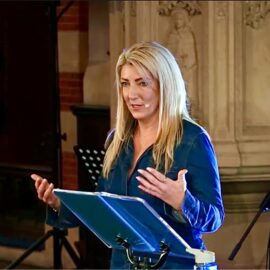We need to talk about this … Addiction surrounds us

In this guest blog, we hear from Emma Heath, Founder of Steps To Active Recovery (STAR), an Christian organisation promoting awareness, providing support, and empowering individuals affected by addiction, compulsive behaviors, and harmful habits.
What can we say about addiction? What message can we give to someone who is hiding in the shadows – either by keeping their addiction a secret or by living in the shadows of our society because they can no longer hold down a job or manage their finances or maintain meaningful relationships? What can we say about this?

Emma Heath, Founder of STAR
For some people, they might not want to hear that life can be different, because they feel they have control of the situation. For others, their situation is a result of circumstances they did not choose to experience and, as a result, they feel completely helpless to live life any differently.
Yet the likelihood is that, deep down, most people who are in addiction will identify with a persistent whisper in the background of their life that something isn’t right. When that small persistent whisper becomes louder and stronger, it is in these moments when individuals and communities can break through the walls that surround those experiencing addiction and help them break out of their unseen prisons.

STAR – Steps to Active Recovery works behind the scenes to help churches, organisations and communities to be prepared when a person reaches out for help. STAR believes that addiction is a community issue which requires a community approach and helps upskill teams of volunteers on the frontlines of support. Offering training, STAR recovery and addiction awareness courses, as well as breaking fear and stigma workshops, we are helping people grow their confidence in this field, whilst committing to provide them with the resources required to take action.
The truth is: communities can’t afford to stand still while the crisis of  addiction abounds around them. Addiction doesn’t discriminate and affects all people regardless of their age, gender, race, and upbringing with increasing numbers of young people being affected by easy access to gambling, pornography and social media. One school’s answer, All Saints’ Catholic College in Notting Hill, is providing 12-hour days to help break smartphone addiction. Ketamine use among young people alone has tripled since 2016, with damaging physical side effects. This year, STAR will be producing resources aimed at helping younger people in society to break free from addiction and destructive, compulsive behaviours.
addiction abounds around them. Addiction doesn’t discriminate and affects all people regardless of their age, gender, race, and upbringing with increasing numbers of young people being affected by easy access to gambling, pornography and social media. One school’s answer, All Saints’ Catholic College in Notting Hill, is providing 12-hour days to help break smartphone addiction. Ketamine use among young people alone has tripled since 2016, with damaging physical side effects. This year, STAR will be producing resources aimed at helping younger people in society to break free from addiction and destructive, compulsive behaviours.
We live in challenging times to say the least. The aftermath of the pandemic along with the cost of living crisis, especially for those in addiction, unemployed and living in deprivation, is clear and palpable. England and Wales now have the highest drug-related death figures on record, and higher levels of statutory addiction support services are at maximum capacity. Addiction continues to rise and it will be a long journey to ensure we have the infrastructure in place to help all affected. In every case, addiction affects one’s social welfare, quality of life, relationships and often employment, pushing individuals to seek help. The challenge is that help can be scattered and sporadic, making it difficult to identify something that will work for each person, plus the taboo nature of addiction makes seeking help feel very lonely.
Come and meet Emma
will be speaking about the work of STAR
Readers may be wondering what they can do to help. The challenges seem so vast and the resources so few, but discovering what help is available and having an answer for those they come across who find themselves in need is the first step. With this in mind, STAR has developed a Discovery Network resource map for Recovery. It is in its infancy, but anyone can recommend locations for their local addiction and recovery support services and they will be added to the map. 
The best advice we can offer to the hidden and not-so-hidden sufferers of addiction and its effects is to break the silence. Shame is a strong prison guard. Fear is even stronger. Breaking the silence about addiction in a safe environment can begin to break the power of addiction over a person’s life and help them take the first steps to recovery. It is of the utmost importance that communities, as well as addiction and recovery services, are ready when the time comes to offer a lifeline of support if they are going to see their communities thrive.


